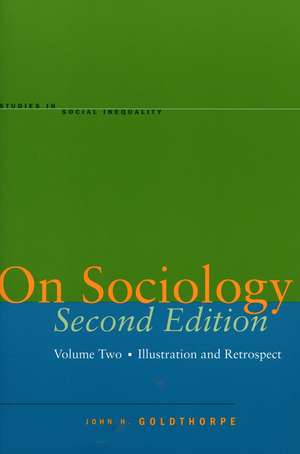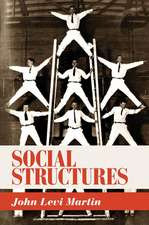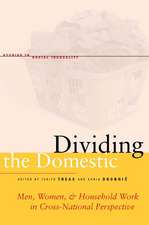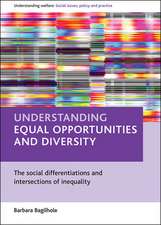On Sociology Second Edition Volume Two: Illustration and Retrospect: Studies in Social Inequality
Autor John Goldthorpeen Limba Engleză Paperback – 22 ian 2007
| Toate formatele și edițiile | Preț | Express |
|---|---|---|
| Paperback (1) | 177.64 lei 3-5 săpt. | |
| Stanford University Press – 22 ian 2007 | 177.64 lei 3-5 săpt. | |
| Hardback (1) | 650.17 lei 6-8 săpt. | |
| Stanford University Press – 22 ian 2007 | 650.17 lei 6-8 săpt. |
Din seria Studies in Social Inequality
-
 Preț: 174.96 lei
Preț: 174.96 lei -
 Preț: 257.29 lei
Preț: 257.29 lei -
 Preț: 197.99 lei
Preț: 197.99 lei -
 Preț: 195.80 lei
Preț: 195.80 lei -
 Preț: 251.37 lei
Preț: 251.37 lei -
 Preț: 102.54 lei
Preț: 102.54 lei -
 Preț: 172.50 lei
Preț: 172.50 lei -
 Preț: 198.43 lei
Preț: 198.43 lei -
 Preț: 154.20 lei
Preț: 154.20 lei -
 Preț: 204.16 lei
Preț: 204.16 lei -
 Preț: 157.07 lei
Preț: 157.07 lei -
 Preț: 199.10 lei
Preț: 199.10 lei -
 Preț: 147.04 lei
Preț: 147.04 lei -
 Preț: 208.69 lei
Preț: 208.69 lei - 19%
 Preț: 511.21 lei
Preț: 511.21 lei -
 Preț: 517.28 lei
Preț: 517.28 lei -
 Preț: 518.09 lei
Preț: 518.09 lei -
 Preț: 226.67 lei
Preț: 226.67 lei -
 Preț: 177.87 lei
Preț: 177.87 lei - 19%
 Preț: 482.53 lei
Preț: 482.53 lei -
 Preț: 523.09 lei
Preț: 523.09 lei -
 Preț: 225.71 lei
Preț: 225.71 lei - 19%
 Preț: 452.09 lei
Preț: 452.09 lei -
 Preț: 483.04 lei
Preț: 483.04 lei -
 Preț: 302.01 lei
Preț: 302.01 lei -
 Preț: 446.64 lei
Preț: 446.64 lei -
 Preț: 518.09 lei
Preț: 518.09 lei -
 Preț: 237.84 lei
Preț: 237.84 lei -
 Preț: 521.90 lei
Preț: 521.90 lei - 19%
 Preț: 476.75 lei
Preț: 476.75 lei -
 Preț: 482.06 lei
Preț: 482.06 lei -
 Preț: 485.15 lei
Preț: 485.15 lei
Preț: 177.64 lei
Nou
Puncte Express: 266
Preț estimativ în valută:
33.99€ • 35.42$ • 28.14£
33.99€ • 35.42$ • 28.14£
Carte disponibilă
Livrare economică 13-27 martie
Preluare comenzi: 021 569.72.76
Specificații
ISBN-13: 9780804750004
ISBN-10: 0804750009
Pagini: 360
Dimensiuni: 156 x 235 x 23 mm
Greutate: 0.5 kg
Ediția:2
Editura: Stanford University Press
Colecția Stanford University Press
Seria Studies in Social Inequality
ISBN-10: 0804750009
Pagini: 360
Dimensiuni: 156 x 235 x 23 mm
Greutate: 0.5 kg
Ediția:2
Editura: Stanford University Press
Colecția Stanford University Press
Seria Studies in Social Inequality
Recenzii
"Goldthorpe, one of Great Britain's most eminent sociologists, finds sociology in a troubling state of disarray. Research and theory proceed in ignorance of each other, and the mantra of "pluralism" undermines the prospect of consensus on the discipline's fundamental purpose and approach. In this expanded, two-volume edition of his manifesto, he proposes a solution to this lamentable state of affairs: make a particular style of research the chief paradigm... The book is useful, erudite, and occasionally provocative."—Contemporary Sociology
"When the most distinguished empirical social researcher in Britain takes on the problem of the relation between theory and research, places the issues in their larger historical setting (based on wide and accurate reading in the historical literature), and also states the issue in current technical terms, and does so with both panache and bite, we get a book that is well worth reading."—American Journal of Sociology
"Goldthorpe's project has all the scope and reach of the post-war functionalist program of Parsons and Merton, but it is likely to be more successful precisely because it allows a substantial role for empirical scholarship and can contain and encompass the ongoing quantitative revolution. . . . The publication of On Sociology will come to be seen as a turning-point in the history of the discipline."—European Sociological Review
"John Goldthorpe has given us a fine book. . . . I cannot think of a better introduction for any aspiring sociologist to the delicate art of synthesizing theory and empirics. . . . Each of Goldthorpe's chapters hammers home the virtues of finding an intellectual rapprochement between statistical modelling, based on large data-sets, structures of social action and interaction, and theory."—British Journal of Sociology
Notă biografică
John H. Goldthorpe is an Emeritus Fellow of Nuffield College, Oxford University. He is a Fellow of the British Academy, a member of the Academia Europaea, and a foreign member of the Royal Swedish Academy of Sciences.
Textul de pe ultima copertă
“When the most distinguished empirical social researcher in Britain takes on the problem of the relation between theory and research, places the issues in their larger historical setting (based on wide and accurate reading in the historical literature), and also states the issue in current technical terms, and does so with both panache and bite, we get a book that is well worth reading.”—American Journal of Sociology
“Goldthorpe's project has all the scope and reach of the post-war functionalist program of Parsons and Merton, but it is likely to be more successful precisely because it allows a substantial role for empirical scholarship and can contain and encompass the ongoing quantitative revolution. . . . The publication of On Sociology will come to be seen as a turning-point in the history of the discipline.”—European Sociological Review
“Goldthorpe's project has all the scope and reach of the post-war functionalist program of Parsons and Merton, but it is likely to be more successful precisely because it allows a substantial role for empirical scholarship and can contain and encompass the ongoing quantitative revolution. . . . The publication of On Sociology will come to be seen as a turning-point in the history of the discipline.”—European Sociological Review
Descriere
Looking to unify increasingly disparate areas of theory and research, John Goldthorpe presents a new mainstream, combining the demonstrated strengths of large-scale quantitative research and the explanatory power of social action theory.


















